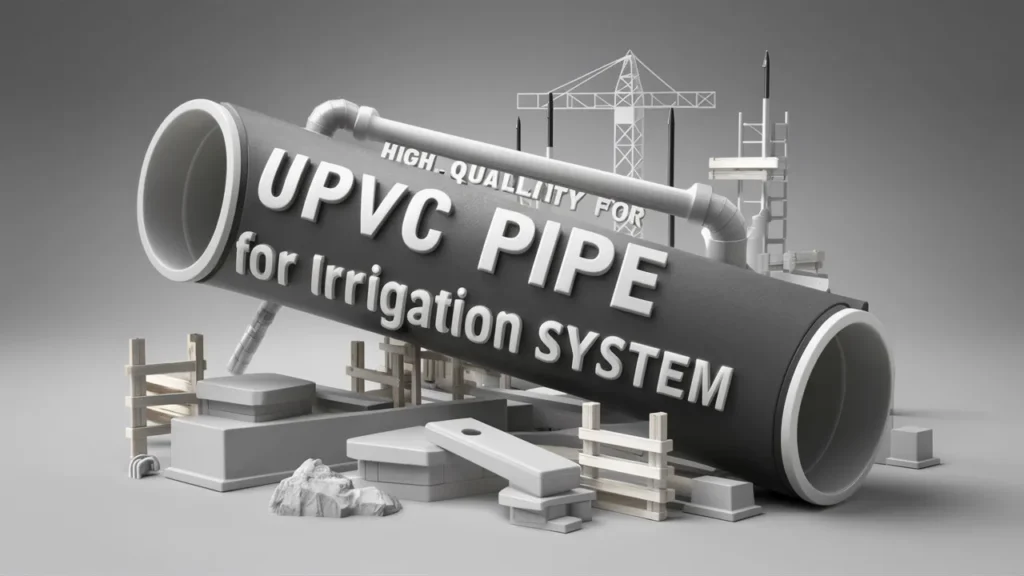Enhance water efficiency in your irrigation system by choosing the ideal UPVC pipe lengths. UPVC pipes, renowned for durability and eco-friendliness, play a vital role in sustainable agriculture and landscaping. From understanding UPVC’s benefits to installation guidelines and maintenance tips, this guide covers everything to ensure optimal performance. Maximize your irrigation system’s efficiency and promote environmental stewardship with UPVC pipe lengths.
Selecting UPVC Pipe Lengths for Efficient Irrigation
UPVC Pipe Length for Irrigation Systems: Enhancing Water Efficiency
In today’s sustainable agriculture and landscaping world, selecting the right materials for irrigation systems is crucial for maximizing water efficiency and promoting environmental stewardship. One such material gaining popularity in the irrigation industry is UPVC, or unplasticized polyvinyl chloride, renowned for its durability, versatility, and eco-friendliness. In this comprehensive guide, we will delve into the importance of UPVC pipe lengths in irrigation, explore efficient irrigation practices, and provide valuable insights into selecting the perfect UPVC pipe lengths for your landscape.
Introduction UPVC pipe length for irrigation system
When irrigating your landscape, the choice of piping material can significantly impact water efficiency and overall system performance. UPVC pipe lengths offer a range of benefits that make them an ideal choice for irrigation systems. Before delving into the specifics of selecting UPVC pipe lengths, let’s first understand their importance in irrigation and explore some efficient irrigation practices.
Understanding UPVC Pipes
UPVC, or unplasticized polyvinyl chloride, is a type of PVC resistant to chemical corrosion and degradation, making it well-suited for irrigation systems. Unlike traditional PVC, UPVC is not softened with plasticizers during manufacturing, resulting in a rigid and durable material that maintains its shape and strength over time. The smooth inner surface of UPVC pipes minimizes frictional losses, ensuring efficient water flow and distribution throughout the irrigation system.
Factors Influencing Irrigation Efficiency
Several factors influence the efficiency of irrigation systems, including the length of UPVC pipes used. The length of the pipe directly affects water distribution uniformity, with longer pipes often resulting in greater pressure losses and uneven watering. Landscape size and layout, soil type, and water absorption rates also play significant roles in determining the optimal pipe length for an irrigation system.
Selecting the Right UPVC Pipe Length
Selecting the right UPVC pipe length involves a careful assessment of landscape requirements, water flow rates, and irrigation zones. By accurately matching pipe length to irrigation zones, you can ensure uniform water coverage while minimizing water wastage. Calculating water flow rates based on landscape needs and hydraulic principles is essential for determining the appropriate pipe length for each zone.
Types of UPVC Pipe Lengths
UPVC pipes are available in standard lengths as well as custom-length options to suit the specific needs of irrigation projects. Standard lengths offer convenience and cost-effectiveness, while custom-length pipes provide flexibility and precision in design. Understanding the pros and cons of each type of UPVC pipe length is essential for making informed decisions when planning an irrigation system.
Installation Guidelines for UPVC Pipes
Proper installation of UPVC pipes is critical for ensuring optimal water flow and system performance. Proper pipe placement, secure anchoring, and attention to slope and grading are essential considerations for preventing leaks, clogs, and drainage issues. Following industry best practices and manufacturer guidelines during installation helps maximize the lifespan and efficiency of UPVC irrigation pipes.
Maintaining UPVC Irrigation Pipes
Regular maintenance is key to prolonging the lifespan and efficiency of UPVC irrigation pipes. Routine inspections, cleaning, and flushing procedures help prevent clogs, corrosion, and other issues that can impede water flow and system performance. Promptly addressing common issues such as leaks and repairs ensures uninterrupted water supply and optimal irrigation efficiency.
Case Studies: Successful UPVC Irrigation Systems
Real-world examples of successful UPVC irrigation systems demonstrate the practical benefits of using UPVC pipes in various applications. From residential landscapes to commercial agriculture and community green initiatives, UPVC irrigation systems offer cost-effective, eco-friendly solutions for maximizing water efficiency and promoting healthy plant growth.
Cost Considerations and Budgeting Tips
While UPVC pipes may have a higher initial investment compared to other materials, their long-term durability and efficiency result in significant cost savings over time. Comparing the cost of UPVC pipes with alternative materials and implementing cost-effective design strategies help optimize budget allocation and maximize return on investment for irrigation projects.
Environmental Impact and Sustainability
UPVC pipes offer several eco-friendly features that contribute to sustainable irrigation practices. Their recyclability, low energy consumption during manufacturing, and resistance to chemical corrosion make them an environmentally responsible choice for water conveyance. Efficient irrigation systems utilizing UPVC pipes help conserve water resources, reduce water waste, and minimize environmental impact.
Regulatory Compliance and Standards
Adhering to local building codes, regulations, and industry standards is essential for ensuring the safety, reliability, and compliance of UPVC irrigation systems. Understanding certification requirements and quality assurance protocols helps guarantee the integrity and performance of UPVC pipes in irrigation applications.
Innovations in UPVC Pipe Technology
Ongoing advancements in UPVC pipe technology drive improvements in manufacturing processes, product performance, and system efficiency. Smart irrigation solutions integrating UPVC pipes offer innovative features such as automated control systems, remote monitoring, and predictive analytics, enhancing water management capabilities and sustainability.
Expert Tips for Maximizing Irrigation Efficiency
Implementing proper scheduling and timing for watering, utilizing drip irrigation systems with UPVC pipes, and incorporating mulching and soil amendment strategies are expert tips for maximizing irrigation efficiency and promoting healthy plant growth. By adopting these practices, you can optimize water usage, minimize water waste, and achieve optimal results in your landscape.
Enhance water efficiency in your irrigation system with UPVC pipe lengths renowned for durability and eco-friendliness. Dive into our comprehensive guide to maximize efficiency and promote environmental stewardship.
As you conclude your journey through irrigation systems, remember the transformative potential of UPVC pipes. Explore our comprehensive guide to select the perfect UPVC pipe lengths and elevate efficiency while minimizing environmental impact.
Conclusion
In conclusion, selecting the perfect UPVC pipe lengths is essential for enhancing water efficiency in irrigation systems. By understanding the importance of UPVC pipes in irrigation, exploring efficient irrigation practices, and following best practices for selecting, installing, and maintaining UPVC irrigation pipes, you can maximize water efficiency, promote environmental sustainability, and achieve optimal results in your landscape. With UPVC pipes, you can enhance the efficiency, durability, and performance of your irrigation system while minimizing water waste and environmental impact.
FAQs: Common Questions About UPVC Pipe Lengths for Irrigation
Addressing common questions and concerns about UPVC pipe lengths helps provide clarity and guidance for readers. Questions such as the ideal pipe length for different landscape sizes, suitability for freezing temperatures, and expected lifespan in irrigation systems offer valuable insights into the practical considerations of using UPVC pipes in irrigation projects.
Q: What factors should I consider when selecting UPVC pipe lengths for my irrigation system?
A: When choosing UPVC pipe lengths, consider factors such as landscape size and layout, water flow rates, and irrigation zone requirements. Assessing these variables ensures uniform water coverage and minimizes water wastage.
Q: Are custom-length UPVC pipes better than standard lengths for irrigation systems?
A: Custom-length UPVC pipes offer flexibility and precision in design, making them ideal for tailored irrigation solutions. However, standard lengths are convenient and cost-effective for simpler installations. The choice depends on project requirements and budget constraints.
Q: How do I calculate the appropriate UPVC pipe length for each irrigation zone?
A: To determine the right pipe length for irrigation zones, calculate water flow rates based on landscape needs and hydraulic principles. Matching pipe length to irrigation zones ensures efficient water distribution and optimal coverage.
Q: Can UPVC pipes be used in freezing temperatures without risk of damage?
A: Yes, UPVC pipes are resistant to freezing temperatures and can withstand cold climates without risk of damage or deterioration. Their durability and flexibility make them suitable for year-round use in various weather conditions.
Q: How long do UPVC pipes typically last in irrigation systems?
A: UPVC pipes have a long lifespan, often lasting several decades with proper maintenance and care. Routine inspections, cleaning, and repairs help prolong the lifespan of UPVC pipes and ensure uninterrupted water supply in irrigation systems.
Q: Are there any regulations or standards I need to adhere to when installing UPVC pipes for irrigation?
A: Yes, it’s essential to adhere to local building codes, regulations, and industry standards when installing UPVC pipes for irrigation. Understanding certification requirements and quality assurance protocols ensures the safety, reliability, and compliance of the irrigation system.
Q: What are the environmental benefits of using UPVC pipes in irrigation systems?
A: UPVC pipes offer several eco-friendly features, including recyclability, low energy consumption during manufacturing, and resistance to chemical corrosion. Efficient irrigation systems utilizing UPVC pipes help conserve water resources, reduce water waste, and minimize environmental impact.


